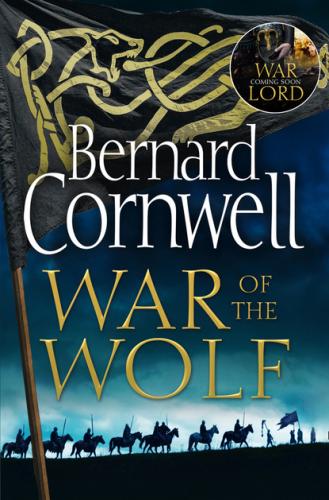I did not go to Æthelflaed’s funeral.
She was buried in Gleawecestre in the same vault as her husband, whom she had hated.
Her brother, King Edward of Wessex, was chief mourner and, when the rites were done and Æthelflaed’s corpse had been walled up, he stayed in Gleawecestre. His sister’s strange banner of the holy goose was lowered over the palace, and the dragon of Wessex was hoisted in its place. The message could not have been plainer. Mercia no longer existed. In all the British lands south of Northumbria and east of Wales there was only one kingdom and one king. Edward sent me a summons, demanding I travel to Gleawecestre and swear fealty to him for the lands I owned in what had been Mercia, and the summons bore his name followed by the words Anglorum Saxonum Rex. King of the Angles and the Saxons. I ignored the document.
Within a year a second document reached me, this one signed and sealed in Wintanceaster. By the grace of God, it told me, the lands granted to me by Æthelflaed of Mercia were now forfeited to the bishopric of Hereford, which, the parchment assured me, would employ said lands to the furtherance of God’s glory. ‘Meaning Bishop Wulfheard will have more silver to spend on his whores,’ I told Eadith.
‘Maybe you should have gone to Gleawecestre?’ she suggested.
‘And swear loyalty to Edward?’ I spat the name. ‘Never. I don’t need Wessex and Wessex doesn’t need me.’
‘So what will you do about the estates?’ she asked.
‘Nothing,’ I said. What could I do? Go to war against Wessex? It annoyed me that Bishop Wulfheard, an old enemy, had taken the land, but I had no need of Mercian lands. I owned Bebbanburg. I was a Northumbrian lord, and owned all that I wanted. ‘Why should I do anything?’ I growled at Eadith. ‘I’m old and I don’t need trouble.’
‘You’re not old,’ she said loyally.
‘I’m old,’ I insisted. I was over sixty, I was ancient.
‘You don’t look old.’
‘So Wulfheard can plough his whores and let me die in peace. I don’t care if I never see Wessex or Mercia ever again.’
Yet a year later I was in Mercia, mounted on Tintreg, my fiercest stallion, and wearing a helmet and mail, and with Serpent-Breath, my sword, slung at my left hip. Rorik, my servant, carried my heavy iron-rimmed shield, and behind us were ninety men, all armed, and all mounted on war horses.
‘Sweet Jesus,’ Finan said beside me. He was gazing at the enemy in the valley beneath us. ‘Four hundred of the bastards?’ he paused. ‘At least four hundred. Maybe five?’
I said nothing.
It was late on a winter’s afternoon, and bitterly cold. The horses’ breath misted among the leafless trees that crowned the gentle ridge from where we watched our enemy. The sun was sinking and hidden by clouds, which meant no betraying sparks of light could be reflected from our mail or weapons. Away to my right, to the west, the River Dee lay flat and grey as it widened towards the sea. On the lower ground in front of us was the enemy and, beyond them, Ceaster.
‘Five hundred,’ Finan decided.
‘I never thought I’d see this place again,’ I said. ‘Never wanted to see it again.’
‘They broke the bridge,’ Finan said, peering far to the south.
‘Wouldn’t you, in their place?’
The place was Ceaster, and our enemy was besieging the city. Most of that enemy was to the east of the city, but smoking campfires betrayed plenty to the city’s north. The River Dee flowed just south of the city walls, then turned north towards its widening estuary, and by breaking the central span of the ancient Roman bridge, the enemy had ensured that no relief force could come from the south. If the city’s small garrison was to fight its way out of the trap they would need to come north or east where the enemy was strongest. And that garrison was small. I had been told, though it was nothing more than a guess, that fewer than a hundred men held the city.
Finan must have been thinking the same thing. ‘And five hundred men couldn’t take the city?’ he said derisively.
‘Nearer six hundred?’ I suggested mildly. It was hard to estimate the enemy because many of the folk in the besiegers’ encampment were women and children, but I thought Finan’s guess was low. Tintreg lowered his head and snorted. I patted his neck, then touched Serpent-Breath’s hilt for luck. ‘I wouldn’t want to assault those walls,’ I said. Ceaster’s stone walls had been built by the Romans, and the Romans had built well. And the city’s small garrison, I thought, had been well led. They had repelled the early assaults, and so the enemy had settled down to starve them out.
‘So, what do we do?’ Finan asked.
‘Well, we’ve come a long way,’ I said.
‘So?’
‘So it seems a pity not to fight.’ I gazed at the city. ‘If what we were told is true, then the poor bastards in the city will be eating rats by now. And that lot?’ I nodded down to the campfires. ‘They’re cold, they’re bored, and they’ve been here too long. They got bloodied when they attacked the walls, so now they’re just waiting.’
I could see the thick barricades that the besiegers had made outside Ceaster’s northern and eastern gates. Those barricades would be guarded by the enemy’s best troops, posted there to stop the garrison sallying out or trying to escape. ‘They’re cold,’ I said again, ‘they’re bored, and they’re useless.’
